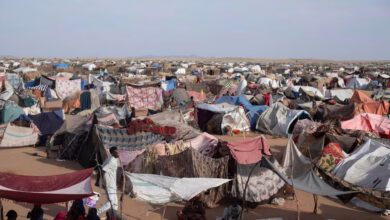The UN on Sunday demanded that Khartoum withdraw its troops from Sudan's Abyei district after what the south branded an "invasion" by northern troops of the flashpoint border region.
A visiting UN Security Council delegation said it was "very, very concerned about the rapidly deteriorating situation in Abyei" and formally called on Khartoum to withdraw its troops.
"The members of the Security Council call upon the government of Sudan to halt its military operation and to withdraw immediately from Abyei town and its environs," the French ambassador to the UN, Gerard Araud, told a joint news conference in Khartoum with his Russian and US counterparts.
The European Union joined the growing chorus of condemnation over the seizure as a threat to peace between Sudan's north and south in the run-up to international recognition of the south's independence in July.
"I condemn the violent incidents in Abyei during the last few days," EU foreign policy chief Catherine Ashton said, pointing out that it violated the Comprehensive Peace Agreement between the two sides, which ended a devastating 1983-2005 civil war.
"I therefore appeal to all parties to resolve their differences in the framework of the CPA," the statement added.
EU foreign ministers would be considering the crisis at their scheduled meeting in Brussels on Monday, she added.
The UN Security Council delegation meanwhile headed to the southern regional capital Juba for talks with southern leaders including President Salva Kiir.
Abyei was granted special status under the 2005 peace deal, and it requires both sides to keep their troops out until a vote on its future.
"We are in control of Abyei and all the area north of the bank of the (Bahr al-Arab) river," Khartoum's minister of state for the presidency, Amin Hassan Omer, said at a news conference in Khartoum.
"This is because there are still elements from SPLA (the south's Sudan People's Liberation Army) trying to enforce their presence in Abyei, and this is not acceptable according to the Abyei protocol and the CPA," Omer said.
South Sudan's government dismissed the allegation as an "absolute lie" and warned that the north's "illegal occupation" of Abyei risked tipping the country back to a conflict that would threaten thousands of lives.
"This is an illegal invasion and breaks all the peace agreements, endangering the lives of thousands of civilians," said south Sudan's information minister, Barnaba Marial Benjamin.
"This event is a long-term plan of the government of Khartoum," he said, accusing the northern troops of "burning houses on a rampage of looting" as he appealed for UN peacekeepers to "come out of their bunkers."
"Women and children are suffering at the hands of an invading army that doesn't care," he said. "They are hungry, in need of medication and out in the heavy rains without shelter."
Senior US Senator John Kerry, a frequent visitor to Sudan who has put huge energy into encouraging the successful implentation of the 2005 peace deal, echoed the warning of the risks of a return to conflict and warned Khartoum it risked torpedoing a promised rapprochement with Washington.
"At this very moment, Sudan stands ominously close to the precipice of war," said Kerry, who chairs the influential Foreign Relations Committee.
"Both sides must put an end to the recent provocations and quickly get back on course before the situation deteriorates any further," he said.
"The cumulative impact of this series of events threatens the lives of those on the ground, the peaceful separation between north and south, and any of Khartoum's hopes for a new relationship with the United States."
Kerry traveled to Sudan in October, November and January in a bid to persuade Khartoum to cooperate with a promised January referendum on independence for the south that delivered a landslide for secession in return for a promise of better ties with Washington.
Fighting in Abyei came to a halt later on Sunday, a joint UN-AU peacekeeping force said.
"This morning there was still some ground fighting and gunfire exchanged, but it appears calm returned in the afternoon," said Kouider Zerrouk.
Aid agency Medecins sans Frontieres, which runs health clinics in Abyei town and 40 kilometres (25 miles) to the south in Agok, said in a statement the "entire population of Abyei town fled the city."
Its clinic in Agok had received 42 wounded people by Saturday evening.
Fighting in Abyei has pitted the former civil war enemies against each other since January, when the district was due to vote on its future alongside the southern independence referendum.
But the plebiscite was postponed indefinitely as the north and south disagreed on who should be eligible to vote in an area where conflicting loyalties and land disputes keep tensions high.




